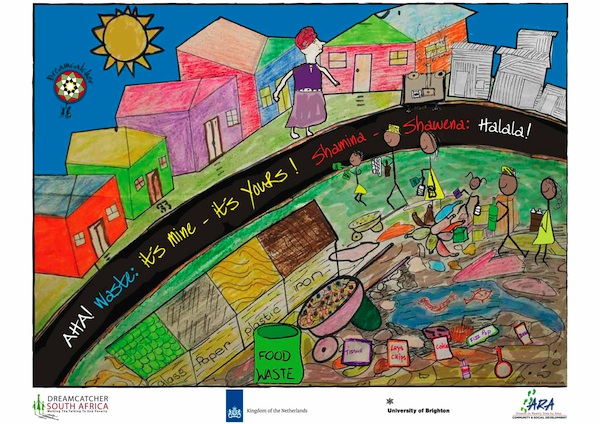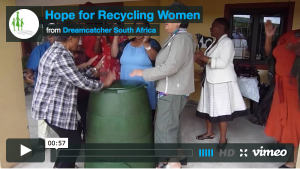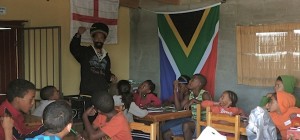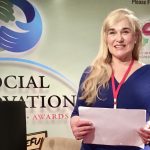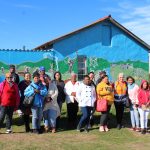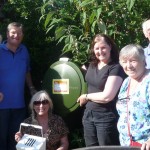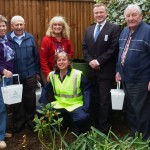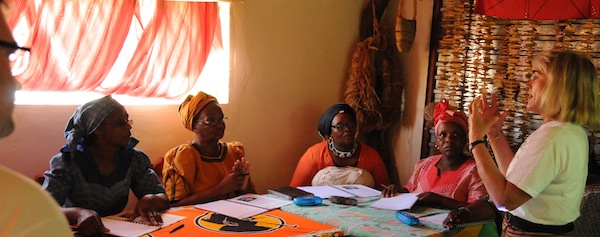
Over 50 registered Dreamcatcher Foundation entrepreneurs, community leader and waste professionals, in what are known as township communities across South Africa, were involved in the ground breaking waste awareness project “Waste: Shamina – Shawena – Waste: It’s Mine – It’s Yours”.
The project aimed to increase awareness of waste issues within communities with a focus on the impact on public health and the environment. Historically townships have been densely populated communities with residents living in close proximity. Waste behaviour in township communities has been closely linked to the legacy of the Apartheid system. The dumping of waste in communities was a way of expressing opposition to the Apartheid system and in addition was a protest against the lack of infrastructure caused by forced removal of citizens. Over time this behaviour manifested itself into negative perceptions towards waste, the local authorities -and lack of co-responsibility for waste in the community. Waste and litter in communities became a way of life. In large parts of South Africa there remains a poor awareness of waste issues and an inadequate collection and treatment infrastructure.
 The “Waste: Shamina – Shawena – Waste: It’s Mine – It’s Yours” project involved training and skills transfer activities which were run over 3 years. The women and men (called Kamamma’s and Bhuti’s) were empowered with skills and knowledge on how to manage waste better where they live, raise awareness to mobilize their own communities and to develop an environmental ethos where they provide their micro tourism services. It is important to note that participants represented 13 diverse cultures and are involved in a host of projects in their communities to uplift those who live in poverty and harsh socio-economic circumstances. Collectively they engage with over 15, 000 people in their communities. Local Authority staff, which included bin men and waste managers, were invited and involved in the project. As a trial, youth from the Dreamcatcher Foundation Communities -and Social development programme attended some further bespoke training.
The “Waste: Shamina – Shawena – Waste: It’s Mine – It’s Yours” project involved training and skills transfer activities which were run over 3 years. The women and men (called Kamamma’s and Bhuti’s) were empowered with skills and knowledge on how to manage waste better where they live, raise awareness to mobilize their own communities and to develop an environmental ethos where they provide their micro tourism services. It is important to note that participants represented 13 diverse cultures and are involved in a host of projects in their communities to uplift those who live in poverty and harsh socio-economic circumstances. Collectively they engage with over 15, 000 people in their communities. Local Authority staff, which included bin men and waste managers, were invited and involved in the project. As a trial, youth from the Dreamcatcher Foundation Communities -and Social development programme attended some further bespoke training.
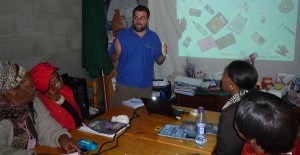 The project aimed to improve the infrastructure for managing waste at a local level and provided a localised solution for food waste by composting using the Green Johanna composter, which provide compost to help communities grow their own food. Other critical benefits are that it eliminates the health impact of food waste – often vermin and dogs would rip open rubbish bags to get to the food leaving waste strewn across communities.
The project aimed to improve the infrastructure for managing waste at a local level and provided a localised solution for food waste by composting using the Green Johanna composter, which provide compost to help communities grow their own food. Other critical benefits are that it eliminates the health impact of food waste – often vermin and dogs would rip open rubbish bags to get to the food leaving waste strewn across communities.
The project included participants working together to develop a waste awareness communications campaign resulting in an eye-catching poster which was distributed within communities.
Dreamcatcher entrepreneurs who were among the participants, have set an example for the rest of the tourism industry to follow and together with their communities developed a model for potential implementation across township communities in South Africa and other similar communities worldwide.
The project was co-developed by Anthea Rossouw, Community Engagement and Social Mobilization expert and founder of Dreamcatcher South Africa and ARA UK, and Dr Ryan Woodard, waste expert and Senior Research Fellow at the University of Brighton in the United Kingdom. Rossouw and Woodard volunteered their time with resources and match funding provided by the Dutch Kingdom, British Airways, Great Green Systems and the University of Brighton.
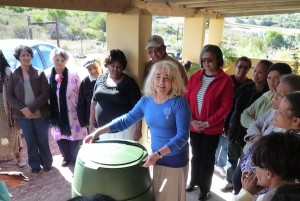
The Outcomes
- The project led to a greater understanding of waste issues amongst participants and motivated them into community mobilizing activities to promote social awareness.
- The participants were empowered to develop into a cooperative network to support each other and share ideas and challenges either at an annual event or by way of text contact via their elected respective leaders who have set up a network via WhatsApp.
- Though participants were from 13 diverse cultural groups from 21 communities, which could be viewed as ‘hard to reach’, they were unified by waste having an impact in their communities.
- Development of a waste awareness poster embodying the input and imagery across a wide cultural spectrum which speaks to all the involved communities in spite of their diversity.
- The Green Johanna composters have a significant impact on the levels of waste being collected by the municipality whilst also a source of compost for local food production.
- Tourists have commented on the environmental ethos of the entrepreneurs and impressed to see composting and clean environment at the tourist service.
- The initiative has given tangible content and measurable outcomes to the 2000 Millennium Charter goals and Objectives of the 2002 World Conference on Responsible Tourism, addressing the environment.
- Awareness in the communities of the job creation potential.
Conclusion & Critical success factors
The project outcome highlight the importance of increased advocacy, effective community engagement, social communication, knowledge transfer, cooperative networking and social mobilisation.
